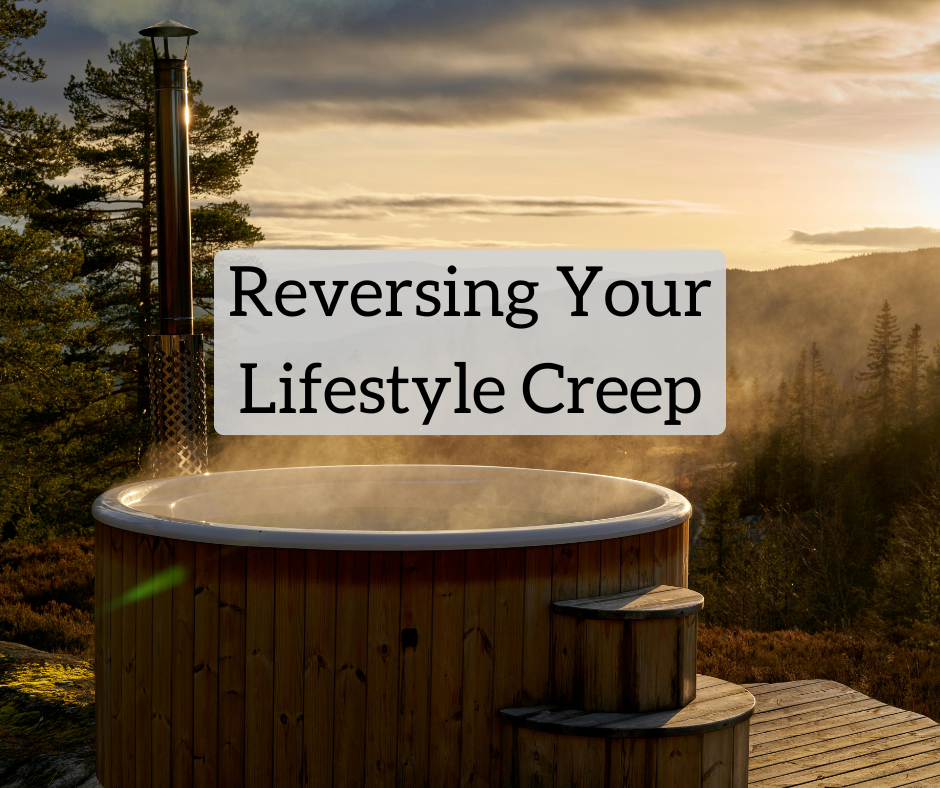By Dr. Joshua White, WCI Columnist
“Living like a resident” has been taught as one of the key principles of The White Coat Investor community because it works. Living 2-5 years on a lot less than you make and aggressively paying off student loans has a reliable track record of helping high-income professionals get off to the right start. But what if you don’t live like a resident? What do you do when you realize you aren’t meeting your financial goals because you have let your lifestyle creep up too much?
An old Chinese proverb says, “The best time to plant a tree is 20 years ago, and the second best time is now.” The best strategy is to live like a resident, or at least live more like a resident. The second-best strategy? Recognize your lifestyle creep and make sacrifices to reverse it. The worst strategy? Let lifestyle creep keep growing unchecked while your future freedom diminishes.
Recognize Your Lifestyle Creep
The first step to reverse your lifestyle creep is to identify it.
I remember planning to live like a resident after residency, but here I was, 2 1/2 years out of training, reflecting on my decisions and my financial trajectory while sitting in my hot tub. Sure, the hot tub was nice, and I loved my house. Still, I was not paying off my student loans nearly as fast as I had initially planned. I was amazed to recall how much more money I was spending compared to when I was a resident, without much of a change in happiness. I estimate I was spending $5,000 more per month than when I was a resident. This is on top of additional expenses, such as a higher cost of living, higher taxes, higher insurance, etc.
Something needed to change. I had let the lifestyle creep in fast, and I needed to reverse it.
Growing up, I lived with six siblings in a mobile home for a few years and then moved into a house over 6,000 square feet that was custom-built on 100 desert acres of property. My father worked as a dentist and commuted 50 miles back and forth. While he made a high income, having seven kids, buying a lot of property, and choosing to build a large new home significantly limited my parents’ options. It was very difficult for them to save adequately. Ironically, in reflecting on my time growing up with my siblings, I realized moving into the larger house added new stressors without leading to a significant increase in happiness.
I saw my parents choose lifestyle creep, which made it difficult to reach their financial goals, and I knew that if I let mine go unchecked, it would lead to similar results. I needed to make a change, and I needed to decide what I was willing to target to reverse my lifestyle creep.
More information here:
Moving The Goalposts – Attack of the Lifestyle Creep
What a Lifestyle Explosion Looks Like
Conduct a Lifestyle Creep Audit: What Are Your Competing Priorities?
The next step to reverse your lifestyle creep is to conduct a lifestyle creep audit.
The antagonist of any goal is a competing priority. Sleeping in can be a competing priority for a goal to go running early in the morning. What are you spending your money on instead of your financial priorities? Common obstacles to financial freedom include expensive housing, expensive cars, and recurring subscriptions, although it can be different for everyone.
You can ask yourself, what big purchases or lifestyle creep changes have occurred in the last 3-5 years? It can be helpful to go through and analyze their impact on your financial life. I call this a lifestyle creep audit.
This is what this exercise looked like for me:
- Dog—Summer 2021: I got a goldendoodle puppy in May 2021. I named her Millie. My co-residents gave her to me free of charge. But I soon found she was the most expensive free dog, as I changed the type of house I bought so she could have a yard.
- House—September 2022: The median cost of a house where I live was $550,000, and mine ended up being just about $600,000. I bought a single-family home with a yard, mostly because of Millie. After my down payment, my monthly payment was around $4,000 per month. This is with an interest rate of 5.875%.
- Hot Tub—Fall 2023: I bought a hot tub, and it cost about $10,000 with another $2,000 for the wiring. The maintenance costs and increase in energy costs added up to around an additional $1,000 per year.
- Vacations in 2023, 2024, and 2025: I went to Jerusalem in 2023, India in 2024, and Alaska and Canada in 2025. I tried to use travel points and chose cheap travel as much as possible, and I probably spent an average of $2,500-$3,000 per trip.
- Wedding—April 2025: I got married! We spent about $25,000 to do everything for our wedding and honeymoon.
Intentional Lifestyle Creep and Intentional Reverse Creep
Review your lifestyle creep audit and ask what lifestyle creep decisions amplified your happiness the most. What would you be willing to sacrifice for more financial freedom? Reviewing my lifestyle creep audit and reflecting on what I wanted to keep and what I wanted to give up was enlightening.
- Dog: Having my dog is totally worth it and something I plan to continue. While expensive, it adds to my happiness and adventure. I go outside more and laugh more, and I think I am more patient because of my dog. That being said, it is difficult when we travel, and I want to accomplish more financial milestones before I think about having more pets.
- Home ownership: I have loved owning a house. I like real estate and even became a real estate agent before buying the house. Even though I thought I was being prudent, I bought a bigger, more expensive house than I needed. This led to more expenses that I did not foresee at the time of purchase. I bought the house, then a fence for my dog, and then a sprinkler system. I added a cement pad, more landscaping, pest control, repairs, etc. The costs multiplied, and after reviewing the amortization schedule, I realized I was paying mostly interest. So, my net worth was not significantly increasing. It made it much more difficult to pay off my student loans as fast as I wanted while saving. In short, it was interfering with my ability to gain more financial freedom. I realized that this was a luxury that I would be willing to sacrifice for a few more years.
- Hot tub: The hot tub was really nice. In the winter, especially. Was it really contributing to my happiness, though? Not really. It frequently required maintenance, and when I realized it could be contributing to getting in the way of my financial goals, it wasn’t a hard decision to let it go.
- Vacations: Essential. Life slows down a bit, and I gain new insight and perspective. In retrospect, I am not doing this enough.
- Wedding and honeymoon: In talking to my wife, we loved our wedding. Even so, we agreed the best parts of our wedding weren’t the parts on which we spent money. In retrospect, while still expensive, we would make more efforts to simplify.
The Result
As a result of my audit and reflections, we put our house up for sale, and we started renting a small but nice townhouse for just about $2,000 per month. We have to take our dog Millie outside for her walks because there is no personal lawn, but we think she likes it better instead of running around outside alone. The house and hot tub were sold, and we had to get rid of a lot of our stuff. We estimate we will save over $30,000 in expenses per year from the change, and we will have a lot fewer headaches.
Just from one housing change, we are saving over $2,500 per month. Utilities are cheaper. We don’t have landscaping or repair costs, and we have less additional furniture. We also made some other changes, like cutting expenses (recurring subscriptions, for instance) that we didn’t think we needed. Life is more peaceful and simple, and we feel more empowered to meet our financial goals. We will miss our house and will plan to buy one in the future after living more like a resident for the next couple of years while we finish paying off our student loans. We estimate we cut our lifestyle creep by more than half. By making some intentional decisions, we are more in line with future goals.
We decided to give up some of our nice things now for more financial freedom in the future, and we definitely think it was worth it.
More information here:
Performing a Personal Financial Health Audit: How Is Your Financial Health?
Make Reversing Lifestyle Creep Easier
- Use life events as an opportunity: New job? Getting married? Selling your house? Use this opportunity to reverse your lifestyle creep. We chose to do this when we got married.
- Predetermine what to do with extra income: Where will your next raise go? Student loans? Mortgage? Without deciding where it will go in advance, it will, by default, likely go to lifestyle creep. The Physician on FIRE made a rule he calls the 10% rule: “For every bump in pay, bonus, or unexpected money that you receive: 10% of the money goes toward lifestyle creep and the other 90% goes toward building wealth.”
- Celebrate immediately when you do any behavior in an effort to reverse your lifestyle creep: BJ Fogg, the well-known behavioral change expert and author of Tiny Habits, teaches that, “When you do a behavior and feel a positive emotion about it, your brain pays attention. It essentially thinks, ‘Wow, that felt good. I want to do that behavior again!’” I invite you to plan what you can do to positively reinforce the behavior you want to reverse lifestyle creep.
Sitting in your own hot tub in a Utah winter is an unforgettable experience, but it pales in comparison to experiencing the peace of realizing you are on the path to meet your financial goals. My wife and I recently got back from a cruise to Alaska, and we couldn’t be happier with the decision to spend more intentionally while choosing to reverse some of our lifestyle creep.
Is lifestyle creep interfering with your financial goals? What have you done to reverse your lifestyle creep? What will your life look like if you choose to reverse your lifestyle creep?

